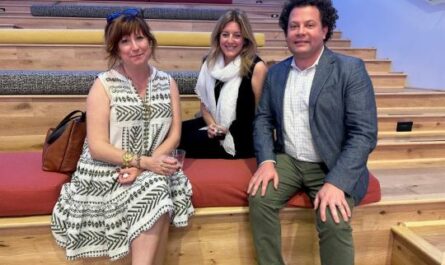Now that’s a headline I never thought I would write.
Famous for basically being famous, Kardashian is that quintessentially American phenomenon: A celebrity spawned by “reality” TV who becomes a brand without making anything herself. How could any of that be good for furniture?
In her defense, Kardashian didn’t intend to help the home furnishings industry, just like she didn’t intend for her sex tape with then-boyfriend Ray J to be exposed. Well, she’s been exposed again, this time for showing off her authentic Donald Judd furniture that, it turns out, probably isn’t authentic Donald Judd furniture at all.
Appearing in a video tour of her Skkn skincare brand offices that was posted to YouTube in August 2022 is a cameo by what look a lot like Judd’s La Mansana table and inset chairs. “If you guys are furniture people, I’ve really gotten into furniture lately,” Kardashian says during the office swag tour. “These Donald Judd tables are really amazing and totally blend in with the seats.” (It’s actually the other way around: The chairs dissolve into the table.)
When the video was pulled down in January, or more than a year after being posted, it had been viewed nearly 4 million times. (I found the video at the Internet Archive’s Wayback Machine, which is a rabbit hole well worth the cabbage. For example, check out FurnitureToday.com from December 1996, that publication’s first website that David Perry, Lester Craft, Vicky Jarrett and I put together under extreme deadline pressure in the web’s early days. So much coffee.)
Judd Foundation v. Kardashian
The cameo spurred a lawsuit brought by the Judd Foundation against both Kardashian and her furniture source, LA-based Clements Design, under trademark law.
“Clements Design’s and Ms. Kardashian’s actions harm Judd Foundation’s reputation by undermining its ability to control the quality of pieces sold under its trademarks, as well as its ability to control Mr. Judd’s name and identity,” the foundation’s complaint reads. According to the foundation’s press release on the suit, Kardashian’s representatives confirmed that the table and chairs were indeed what we in the industry call “knockoffs,” an admission that puts Clements Design in a very bad spot.

(Screen grab from YouTube)
“This case is about protecting the intellectual property rights of Judd Foundation, including its trademarks and copyrights,” Judd Foundation attorney Megan K. Bannigan said. “The existence and promotion of fake Donald Judd furniture harms both consumers and Judd Foundation. The fake furniture has caused massive consumer confusion, with millions of Ms. Kardashian’s followers being misled to believe that the furniture in Ms. Kardashian’s office is real Donald Judd furniture.”
Bannigan’s assertion that the widely viewed Kardashian office tour had caused confusion in the marketplace is a paraphrase of the core claim of the lawsuit, and it’s the contribution Kardashian inadvertently makes to our industry. Knockoffs, copycat furniture, replicas and what we might broadly call intellectual theft have plagued the furniture industry since the advent of either furniture or lawyers (or both). I’m pretty sure the first wheel in the fourth millennium B.C. led to a knockoff axle-and-wheel and, subsequently, the first Sumerian v. Sumerian lawsuit.
‘Inspired by’ or ‘stolen from’?
Admittedly, the distinction between trade dress and homage is fine, and there are only so many ways to make a chair or a table. But, when a designer or furniture maker has advanced the whole idea of furniture and what furniture can be and do? That deserves what copyright law intends, which is enough protection such that the designer or furniture maker believes him- or herself incented to bring the design to market.
Here are Jefferson’s own words, from 1813:
If nature has made any one thing less susceptible than all others of exclusive property, it is the action of the thinking power called an idea, which an individual may exclusively possess as long as he keeps it to himself; but the moment it is divulged, it forces itself into the possession of every one, and the receiver cannot dispossess himself of it. . . . Society may give an exclusive right to the profits arising from [the ideas], as an encouragement to men to pursue ideas which may produce utility.
In short, the law must furnish enough protection of the expression of idea to incent that idea’s beholder to share it with the rest of us. The law can’t protect the idea, for the reason Jefferson articulates, but it can protect its expression. And while it’s increasingly difficult to innovate a table or a chair to the level that might warrant the law’s protections, where a design clearly seeks to trade on the fame of a preceding version of the same, intellectual property theft has likely taken place.
To enforce those trademarks, however, litigation is sometimes necessary, as is educating the public about the need to protect original works and their designers. Not all or even most furniture companies have the time, expertise and resource to police the marketplace.
“If creators’ works can simply be usurped with no repercussions and exploited by other people, what will be the protection for artists and designers to further create in the future?” asked Rainer Judd, president of Judd Foundation and daughter of the artist.
Thanks, Kim!
Thus, Kardashian (and Clements Design) have done the industry a great service in providing this education to the public and, by being the targets of litigation brought by the Judd Foundation, in providing important case law that will guide future trade dress disputes. These are contributions obviously neither corporate entity sought, but, for very different reasons, they are contributions they have nonetheless made. Kardashian didn’t do her homework. (In the video, she admits she can’t even operate her own luxury car.) If the foundation’s claims are true, Clements Design didn’t either, preferring instead to crib Donald Judd’s notes.
This gets to another problem of trade dress. To my previous statement in this column, I had to add, “If the foundation’s claims are true,” because I’d like to avoid a libel suit. I’m not a furniture designer, nor am I an intellectual property lawyer. I don’t even play one on TV. Thus, I can’t say as empirical fact whether the Kardashian office table is or isn’t a Judd knockoff. I can only say that, as First Amendment-protected fair comment, criticism and opinion, the office table and the original La Mansana look pretty much the same in photos posted on the web. Clements Design is likely to argue that La Mansana inspired its pieces for Kardashian but that these pieces aren’t knockoffs.
Capitalizing on the intersection of celebrity and high-end furniture, The New York Times developed an interactive quiz for readers to test their ability to distinguish the genuine Donald Judd from the knockoff, presenting versions of a bookcase, chair, table, bench and cart. (I scored a 3.)
Donald Clarence Judd
Before I close, a final word about Judd, who died in New York City in 1994. A key figure in the Minimalism movement of the 1960s, the Missouri-born Judd was an artist, sculptor and, obviously, furniture designer. In 2020, the Museum of Modern Art in New York exhibited a retrospective of some of Judd’s work, including furniture pieces.
Because of the whole idea of minimalism, its objects are easier to replicate than, say, baroque or Victorian. Like midcentury modern, minimalism seeks to be simple but not simplistic, clean but not sterile. These attributes make it ripe for copying. A Google search for “Judd knockoffs” led me to mostly legitimate sources and marketplaces, including Etsy, Happy Medium and Interior Icons. (The sponsored link for this particular key word search: Wayfair.)
While Judd and his objects are in demand, his popularity can’t be reasonably compared to that of Kardashian, which is another aspect of this lawsuit that is worth noting. In an era in which AI is threatening to overwhelm what we might call genuine artistry and creativity with oceans of regurgitated “mid” that pass themselves off as original and artistic, the Judd claim is a flag in the sand. The lawsuit seems to be also saying, “By God, originality still matters, and it’s worth valuing and paying for!” (The La Mansana table is valued at $90,000.)
“Kim Kardashian is so much more famous than Donald Judd, plus every other minimalist artist combined, it is a sort of funny thing not to want to be associated,” Amy Adler, a law professor, told The New York Times. “But I think that it is an attempt to draw lines between the pure, high-minded art world and pop culture.”
In a world of perfect copies (perfect only in the sense of fidelity to the original), of photo filters and AI everything, the real deal is more than worth protecting. It might even be sacred.





